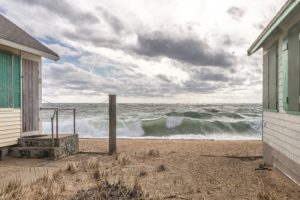PLYMOUTH — An Environmental Protection Agency official criticized Holtec International last week for misleading the public about its proposed dumping of radioactive water from the Pilgrim Nuclear Power Station into Cape Cod Bay.
Kenneth Moraff, the EPA’s regional water director, said that a fact sheet and a public letter recently released by the company have “engendered considerable public confusion.” Holtec purchased the power plant after it was permanently shut down in 2019 and is in the process of decommissioning it.
“Contrary to the implication in the letter that discharges of spent fuel pool water are allowed by the EPA, any such discharge is explicitly prohibited by the company’s Clean Water Act discharge permit, unless there are no CWA-regulated pollutants present,” wrote Moraff in a letter dated Feb. 17.
While the Nuclear Regulatory Commission regulates radioactive materials, the EPA regulates a wide range of other contaminants. A full analysis of what’s in the water has not yet been done.
“The presence of any of those [contaminants] would require further analysis and permitting before any discharge would be allowed,” Moraff wrote.
If there are any pollutants that are listed in Pilgrim’s discharge permit, releasing the water into the bay would be a violation of EPA regulations.
Pilgrim was shut down after a troubled history. Entergy Corp., the plant’s longtime owner, sold it to Holtec after the shutdown.

The company recently finished transferring radioactive assemblies from a spent-fuel pool to steel-lined dry casks. Holtec is now considering how it will get rid of the 370,000 gallons of radioactive water from the pool, along with more than 600,000 gallons of radioactive water from the reactor cavity and other systems.
Three options are under consideration. The cheapest is to release the water, after some filtering, into Cape Cod Bay in batches of 20,000 gallons. Holtec clearly favors this option, based on its public statements.
A second option is to evaporate the water. In a public statement last month, Holtec said this option would require large amounts of electricity and possibly a diesel generator to produce enough heat.
A third option would be to truck it out of state to a licensed disposal facility, a process currently being used by NorthStar, the company decommissioning the Vermont Yankee nuclear plant. In its public letter, Holtec cited the danger of an accident in that process.
Moraff pointed out the possible benefit that evaporation or trucking might have, since they wouldn’t trigger requirements in the plant’s discharge permits.
If Holtec has to request an amendment to its current permit, that would slow down the decommissioning process, which is on a fast track to be completed by 2027, and possibly cut into the company’s anticipated profits. The decommissioning fund for Pilgrim held a little over $1 billion in ratepayer money, which Holtec has been tapping for decommissioning. Whatever is left in the fund once the job is done is Holtec’s to keep.
The discharge permit may not be the only obstacle to Holtec’s plan to release a million gallons into the bay. Two bills that would prohibit such discharges are now pending in the state legislature.
There has also been considerable pushback from the state’s fishing and shellfishing communities.
The Cape Downwinders, a Pilgrim watchdog group headed by Harwich resident Diane Turco, has placed a nonbinding public advisory question on the spring ballots in all Barnstable County towns. The question asks whether local officials should be directed to urge Gov. Charlie Baker, Attorney General Maura Healey, and the state legislature “to employ all means available to ensure that Holtec commits to immediately withdraw any plans to dump radioactive water into Cape Cod Bay.”
In Wellfleet, where shellfishing is a major industry, select board chair Ryan Curley has proposed a town meeting article asking voters to establish a contingency fund of up to $30,000 to help cover legal expenses related to the effort to stop Holtec. Earlier this week, Curley said not all board members were in favor of asking town meeting to create the fund, “but I think it should be up to the voters.”



